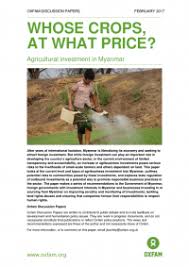Our Vision
Our vision is a just world without poverty. We want a world where people are valued and treated equally, enjoy their rights as full citizens, and can influence decisions affecting their lives.
Our Purpose
Our purpose is to help create lasting solutions to the injustice of poverty. We are part of a global movement for change, empowering people to create a future that is secure, just, and free from poverty.
Achieving our Purpose
We use a combination of rights-based sustainable development programs, public education, campaigns, advocacy, and humanitarian assistance in disasters and conflicts.
We challenge the structural causes of the injustice of poverty, and work with allies and partners locally and globally.
Resources
Displaying 46 - 50 of 128Whose Crops, At What Price? Agricultural investment in Myanmar
After years of international isolation, Myanmar is liberalizing its economy and seeking to attract foreign investment. But while foreign investment can play an important role in developing the country’s agriculture sector, in the current environment of limited transparency and accountability, an increase in agribusiness investments poses serious risks to the livelihoods of small-scale farmers and others dependent on land.
Common ground: Securing land rights and safeguarding the earth. A Global Call to Action on Indigenous and Community Land Rights
Up to 2.5 billion people depend on indigenous and community lands, which make up over 50 percent of the land on the planet; they legally own just one-fifth. The remaining land remains unprotected and vulnerable to land grabs from more powerful entities like governments and corporations. There is growing evidence of the vital role played by full legal ownership of land by indigenous peoples and local communities in preserving cultural diversity and in combating poverty and hunger, political instability and climate change.
Common ground: Securing land rights and safeguarding the earth. A Global Call to Action on Indigenous and Community Land Rights
Up to 2.5 billion people depend on indigenous and community lands, which make up over 50 percent of the land on the planet; they legally own just one-fifth. The remaining land remains unprotected and vulnerable to land grabs from more powerful entities like governments and corporations. There is growing evidence of the vital role played by full legal ownership of land by indigenous peoples and local communities in preserving cultural diversity and in combating poverty and hunger, political instability and climate change.
Common ground: Securing land rights and safeguarding the earth. A Global Call to Action on Indigenous and Community Land Rights
Up to 2.5 billion people depend on indigenous and community lands, which make up over 50 percent of the land on the planet; they legally own just one-fifth. The remaining land remains unprotected and vulnerable to land grabs from more powerful entities like governments and corporations. There is growing evidence of the vital role played by full legal ownership of land by indigenous peoples and local communities in preserving cultural diversity and in combating poverty and hunger, political instability and climate change.
Las mujeres rurales de América Latina son luchadoras, no criminales
Las mujeres que demandan el cumplimiento del derecho a la igualdad y luchan para acceder al uso de recursos naturales y propiedad de la tierra son frecuentemente victimas de presión, amenazas o criminalización de sus actividades. En Honduras por ejemplo, entre el 2010 y el 2012 hubo más de 684 casos de campesinas procesadas en 15 departamentos del país. En 2013, la cifra sumó más de 700 expedientes judiciales en contra de mujeres que participaron en diferentes procesos de recuperación de tierras.




